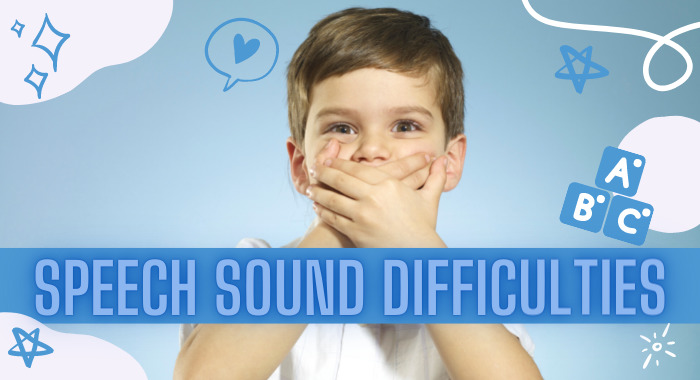What are Speech Sound Difficulties?
When children are learning to talk, they gradually learn to say different speech sounds. It is normal for a child to make speech sound errors when they are learning. There is in fact a pattern of speech sound errors that all typically developing children make. Children are however expected to master different speech sounds by a certain age. A child’s speech may be delayed for their age, or it may be disordered. For more information on typical speech sound development, read our blogpost on the topic HERE.
What is a Speech Delay?
A child who has delayed speech or a speech sound delay may be following typical speech sound developmental patterns, but they are making those errors beyond the average age that is expected.
What is a Speech Disorder?
A child who has disordered speech or a speech sound disorder is making speech sound errors that do not follow a typical developmental pattern, or they may be making a wide range of speech sound errors that result in their speech being difficult to understand.
Tips on how to support your child with speech sound difficulties...
If your child makes a speech sound error when saying a word, try not to directly tell them that they have made an error. Avoid saying things such as "No, that's the right, say that again ... don't say TAR say CAR.". Instead, give a good model by repeating the word and emphasising the correct speech sound with your voice by making it a bit longer. Try to repeat the word a few times in short phrases.
Model the correct speech sound production in words
Modelling a word is usually most effective when you do it repetitively (see examples above of how you could model the word 'car'). Your child may need to hear you saying the word many times before they begin to say it correctly, but don't despair. When you give your child a good model, they are listening to the correct pronunciation. You are indirectly correcting them but they are not under any pressure to repeat the word. They therefore won't feel as though they have done something wrong and lose confidence when speaking.
2. Have conversations in context.
Having more conversations in context will also give you more opportunities to model target words clearly for your child. When you talk about the here and now, it will usually be much easier to know what your child is saying. Playtime can provide lots of opportunities for this. There are also lots of everyday activities that can provide a context such as bath time, doing laundry, getting ready for bed. Remember to repeat words and emphasise the correct speech sounds if your child makes errors rather than telling them they have made an error.
3. Reduce questioning and make more comments.
We naturally ask others questions to get them to talk. Many parents will ask their child questions for the same reason. Some parents find themselves asking questions to which they already know the answer. They often do this as they feel more comfortable if they know what their child may be saying. They may also do this as a means of checking that their child can say certain words.
When you make comments, you are showing an interest in what your child is doing and you are not placing them under any pressure to talk. In fact, your child will probably begin to talk more. Another benefit to making comments is that your child is hearing you say the words correctly. It is not realistic to completely avoid questions so a good aim is to make three comments for every question that you ask.
4. Encourage other means of getting the message across.
Sometimes, you have no idea what your child has said. If this happens, reassure your child that it is okay. You could tell them "I don't fully understand but it's okay." Then encourage them to show you by pointing or taking you to what they are talking about. Sometimes drawing can help too. If your child does show you what they mean, give them a good model by saying the words you didn't understand e.g. "Oh you want your school bag". Again emphasise the correct speech sounds when you say the words.
5. Try to establish a key topic.
Sometimes, you just won't know the topic of what your child is talking about as they will naturally tell you things that are not in context/ not happening in the here and now. It can help to establish the topic of what your child is talking about. Ask them yes/no questions about what they are telling you e.g "are you telling me about something in the room?, are you telling me about something at playschool?". Once you've understood what your child has said, repeat it back to them so that they hear the words being spoken correctly and they know you have understood.
6. Ask for repetition is a positive way.
If you have not understood what your child has said, you may understand if they repeat it. Try to ask for repetition in a positive way by blaming your ears. For example you could say "My ears missed that ... can you tell me that again?" or "my old ears didn't hear you". Place your hand behind your ear to gently hint that you want your child to repeat. Taking the blame for not understanding your child can help preserve their confidence and make them less reluctant to repeat themselves.
Anna Keno - Speech Language Therapist (BSLT, MNZSTA, SCA, ATCL, ASB)


